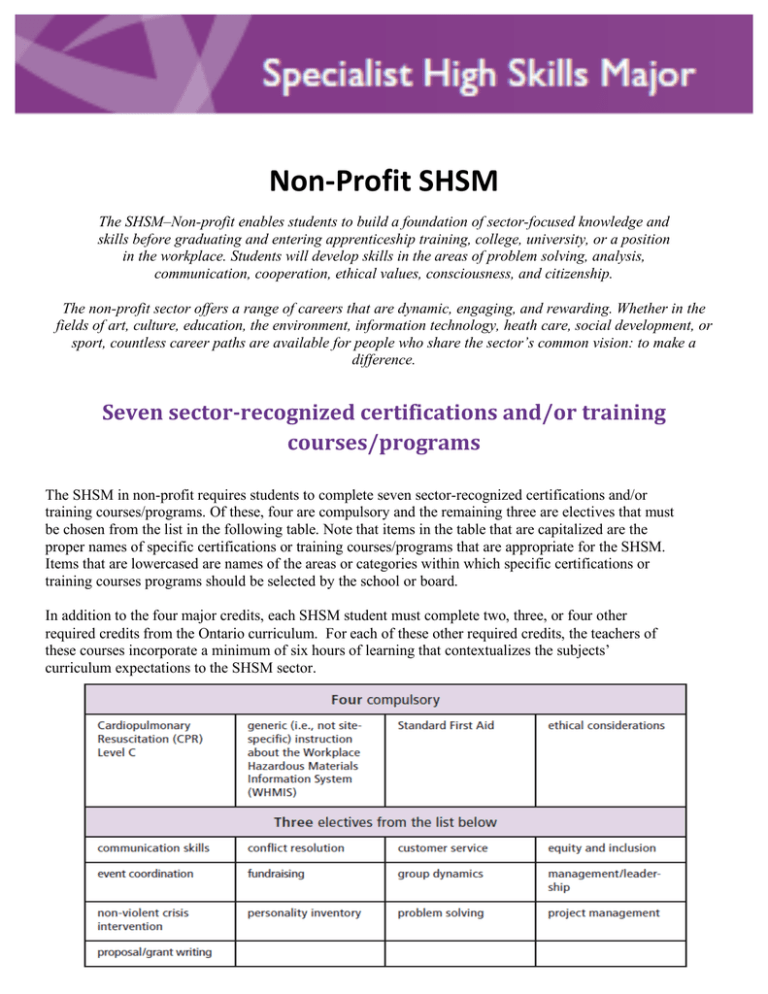Non‐Profit SHSM
advertisement

Non‐Profit SHSM The SHSM–Non-profit enables students to build a foundation of sector-focused knowledge and skills before graduating and entering apprenticeship training, college, university, or a position in the workplace. Students will develop skills in the areas of problem solving, analysis, communication, cooperation, ethical values, consciousness, and citizenship. The non-profit sector offers a range of careers that are dynamic, engaging, and rewarding. Whether in the fields of art, culture, education, the environment, information technology, heath care, social development, or sport, countless career paths are available for people who share the sector’s common vision: to make a difference. Seven sector­recognized certifications and/or training courses/programs The SHSM in non-profit requires students to complete seven sector-recognized certifications and/or training courses/programs. Of these, four are compulsory and the remaining three are electives that must be chosen from the list in the following table. Note that items in the table that are capitalized are the proper names of specific certifications or training courses/programs that are appropriate for the SHSM. Items that are lowercased are names of the areas or categories within which specific certifications or training courses programs should be selected by the school or board. In addition to the four major credits, each SHSM student must complete two, three, or four other required credits from the Ontario curriculum. For each of these other required credits, the teachers of these courses incorporate a minimum of six hours of learning that contextualizes the subjects’ curriculum expectations to the SHSM sector. These credits make up the bundle: • Four major credits that provide sector-specific knowledge and skills • Three other required credits from the Ontario curriculum, in English, mathematics, and business studies or science, in which some expectations are met through learning activities contextualized to the non-profit sector • Two cooperative education credits that provide authentic learning experiences in a workplace setting, enabling students to refine, extend, apply, and practice sector-specific knowledge and skills. Any SHSM can be designed to focus on a specific area within the given sector – for example, the SHSM– Non-profit can focus on international development, community action, or some other area of the nonprofit sector. This focus is achieved through the selection of the four major credits in the bundle. Depending on local circumstances, boards may elect to offer one or more variants of the SHSM in a given sector, each with a particular area of focus. Major Credits Each SHSM includes four major credits – two Grade 11 courses and two Grade 12 courses –that enables students to build a foundation of sector-focused knowledge and skills before entering a postsecondary destination. These credits are specific to the destination and may be: • Ontario curriculum credits • Ministry-approved locally developed credits (LDCs) • Ministry-approved credits for learning acquired outside the Ontario curriculum, such as dual credits. How are credits organized? The credits in the bundle provide students with technical knowledge and skills particular to, and valued by, the SHSM sector. Therefore, the required credits for each SHSM will vary, depending on: • The specific sector of each SHSM program • The student’s chosen pathway to one of four postsecondary options – apprenticeship training, college, university, or the workplace – within each SHSM. How do students benefit? This component of the SHSM enables students to acquire the knowledge and skills related to safe work habits and sector-specific training. In addition, students with sector-recognized certifications and training have an advantage when entering the workforce. FOR MORE INFORMATION: Visit the Ontario SHSM e-Community website at http://community.elearningontario.ca. OR: http://www.edu.gov.on.ca/morestudentsuccess/NonProfit.pdf http://www.edu.gov.on.ca/morestudentsuccess/sector/19_NonProfit.pdf

